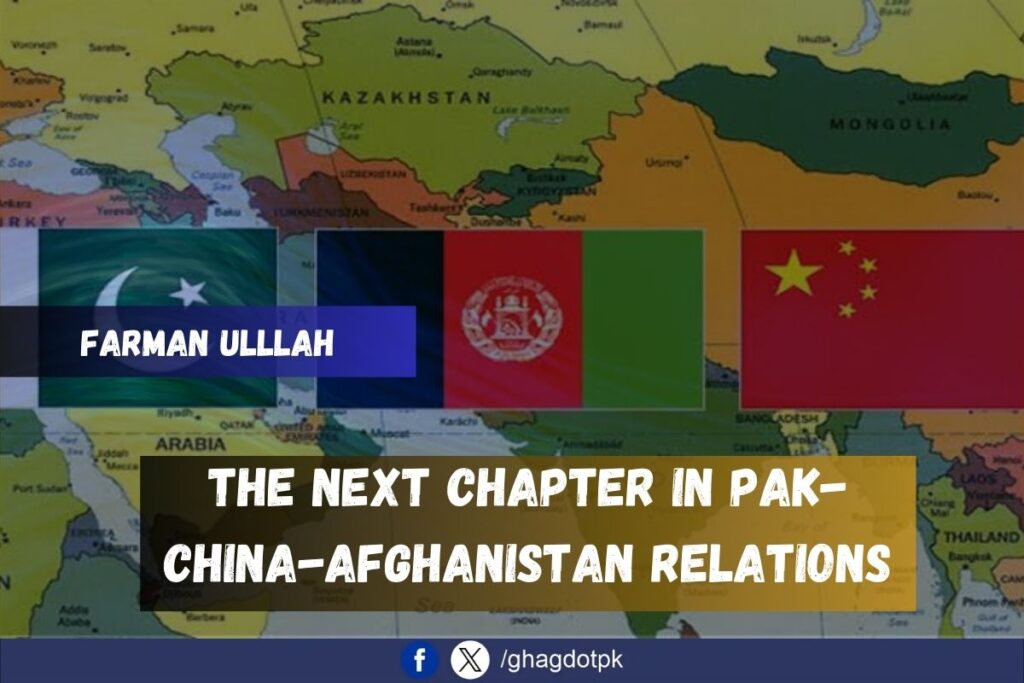By Farman Ullah
Pakistan, China, and Afghanistan have strengthened their diplomatic and economic ties through a trilateral meeting in Beijing. The meeting, attended by China’s Foreign Minister Wang Yi, Pakistan’s Deputy Prime Minister and Foreign Minister Ishaq Dar, and Afghanistan’s Acting Foreign Minister Amir Khan Muttaqi, focused on improving relationships and regional cooperation.
A key agreement was reached for Pakistan and Afghanistan to exchange ambassadors, upgrading their partnership. This move is expected to improve relations between the two countries, which have had tensions over issues like Afghan refugees and cross-border security. China welcomed this development and expressed its willingness to continue assisting in improving Afghanistan-Pakistan relations.
The decision to exchange ambassadors is significant, as it marks a new era in diplomatic relations between Pakistan and Afghanistan. For years, the two countries have had a complex relationship, with periods of tension and cooperation. The exchange of ambassadors will provide a platform for regular dialogue and cooperation, helping to address common challenges and opportunities.
Regional security was another key area of discussion during the meeting. The three countries agreed to work together to combat terrorist groups and protect the region’s stability. Pakistan raised concerns about the presence of terrorist groups on Afghan soil, including the Tehreek-e-Taliban Pakistan (TTP) and the Balochistan Liberation Army (BLA). These groups have been responsible for several attacks in Pakistan, resulting in significant loss of life and property.
The TTP, also known as the Pakistani Taliban, is a militant group that has been waging a violent campaign against the Pakistani government and military. The group has been responsible for several high-profile attacks, including the 2014 Peshawar school massacre, which killed over 150 people, mostly children.
The presence of these groups in Afghanistan has been a major concern for Pakistan, which has accused the Afghan government of providing them safe haven. Afghanistan has denied these allegations, but Pakistan has repeatedly called for greater cooperation in combating terrorism.
During the meeting, the three countries agreed to cooperate in security matters and combat terrorist groups jointly. This includes sharing intelligence, conducting joint operations, and providing support to each other’s law enforcement agencies. The agreement is significant, as it marks a new level of cooperation in regional security.
Economic collaboration was another key focus of the meeting. The three countries discussed expanding the China-Pakistan Economic Corridor (CPEC), a major infrastructure project that aims to connect China’s western regions to the Arabian Sea through Pakistan. The project includes a network of roads, railways, and pipelines, and is expected to boost trade and economic growth in the region.
The CPEC has been a game-changer for Pakistan, providing new opportunities for economic growth and development. The project has also helped to improve relations between Pakistan and China, which have a long-standing friendship and strategic partnership. During the meeting, China and Pakistan pledged to support Afghanistan’s reconstruction and development, offering assistance in rebuilding and growth.
Afghanistan has been facing significant challenges in recent years, including a devastating economic crisis, widespread poverty, and a struggling healthcare system. The country has also been plagued by violence and instability, with the Taliban militant group controlling large parts of the country.
The offer of assistance from China and Pakistan is significant, as it provides new opportunities for economic growth and development in Afghanistan. The CPEC project has the potential to transform the regional economy, providing new opportunities for trade and investment.
The trilateral meeting also highlighted the strategic role of the China-Afghanistan-Pakistan Foreign Ministers’ Dialogue. The dialogue provides a platform for regular consultations and cooperation between the three countries, helping to address common challenges and opportunities.
The next foreign ministers’ meeting will be held in Kabul at a convenient time. This will provide an opportunity for the three countries to review progress and discuss new initiatives in regional cooperation. The meeting will also help to strengthen the China-Afghanistan-Pakistan partnership, providing new opportunities for economic growth and development in the region.
The trilateral meeting between Pakistan, China, and Afghanistan marked a significant step towards strengthening regional ties and cooperation. The agreements reached during the meeting are expected to improve economic and security relationships, ultimately benefiting the region’s stability and development. The exchange of ambassadors between Pakistan and Afghanistan is a significant development, providing a platform for regular dialogue and cooperation. The agreement to combat terrorist groups jointly is also a major breakthrough, helping to protect the region’s stability and security.
The CPEC project has the potential to transform the regional economy, providing new opportunities for trade and investment. The offer of assistance from China and Pakistan to Afghanistan is significant, providing new opportunities for economic growth and development. The China-Afghanistan-Pakistan partnership has the potential to become a major player in regional affairs, providing a platform for cooperation and development.






